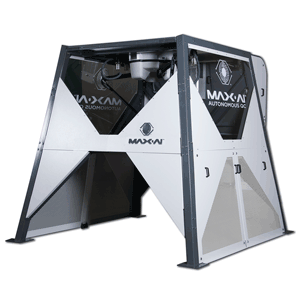
 Bulk Handling Systems (BHS), Eugene, Oregon, and its wholly owned subsidiary NRT, Nashville, Tennessee,
Bulk Handling Systems (BHS), Eugene, Oregon, and its wholly owned subsidiary NRT, Nashville, Tennessee,
have announced the introduction of Max-AI technology, an artificial intelligence (AI) that identifies recyclables and other items for recovery. Through deep-learning technology, Max-AI employs both multilayered neural networks and a vision system to see and identify objects similar to the way a person does, the company says. The technology is designed to drive improvements in material recovery facility (MRF) design, operational efficiency, recovery, system optimization, maintenance and more.
The first available machine using Max-AI technology is an autonomous quality control (AQC) unit that sorts container streams following optical sorting. This robotic sorter uses its vision system to see the material, its artificial intelligence to think and identify each item and a robot to pick targeted items. This system is able to make multiple sorting decisions autonomously, for example separating various materials such as thermoform trays, aluminum and fiber while removing residue from a stream of polyethylene terephthalate (PET) bottles. All of this is done at rates exceeding human capabilities, BHS says.
BHS CEO Steve Miller says, “Labor is a significant challenge for MRF operators and it’s obvious that Max will be very beneficial in helping our customers manage that aspect of their business. However, the highest returns will come from complete integration of Max-AI technology throughout every advanced BHS system. Our customers will not only have autonomous sorting but also an intelligent central nervous system that observes what’s happening in the plant in real-time and adjusts process parameters to maximize profits.”
The first commercial AQC unit is already in operation at Athens Services’ MRF in Sun Valley, California. A recipient of the Solid Waste Association of North America (SWANA) Award for Excellence in 2016, Athens was an ideal location for the first installation of Max-AI robotic sorters to complement the advanced screen, air and optical separation technology already in use, BHS says. Integrating seamlessly with the company’s existing NRT optical sorters, Max provides a fully autonomous PET sorting solution, the company adds.
“This technology was simply not possible until now,” says Thomas Brooks, BHS director of technology development. “Recent advances in computer processing capabilities have enabled us to develop this groundbreaking machine learning platform. Max is more than just a robotic sorter. Max-AI technology will soon become the active brain of our MRFs, controlling various robotic, optical and other sorting equipment, providing real-time material composition analysis, and making autonomous decisions.”
Max is central to BHS’ plan to bring autonomous optimization to MRFs over the coming years, increasing performance and profitability. Roy Miller, BHS vice president of engineering, says he sees this as revolutionary for the recycling industry. “For me, this is the culmination of decades of technological development in recycling. Operating costs will go down while uptime, throughput, recovery and purity will all increase, leading to significant economic benefits for our customers and environmental gains for stakeholders everywhere. This is an exciting time indeed.”
More information is available at max-ai.com.
Watch a video of the Max-AI by clicking below.